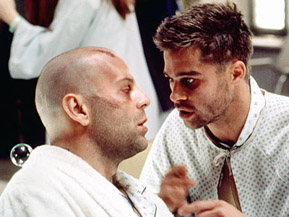|
|
Viking Night: 12 MonkeysBy Bruce HallFebruary 16, 2011
The entire question of who’s crazy and who’s not ends up being beside the point because the weird convict and his eminent shrink both eventually come to believe in the same thing, just for different reasons. Some people let reality shape their opinions, while others let their opinions shape reality. Some people assign significance to events based on a pre-existing ideology or methodology, applying the same solutions to every problem. Others simply allow the context of an event to guide their reaction to it. At different times in the story Cole struggles with one while Railly struggles with the other, and the suggestion seems obvious, at least to me: Neither way of thinking is universally flawless. They’re both necessary and the trick is to know when one is needed over the other. I have a friend whose favorite tension breaking catch phrase is “Where’s Bruce Willis when you need him?” I always assumed he was referring to John McClane, but maybe he’s talking about James Cole. In this increasingly Red State, Blue State society of ours, a message of intellectual flexibility delivered by a hard luck regular Joe might be just what the doctor ordered. Maybe that really is the best kind of time travel story there is.
|

|
|
|

|
Friday, November 1, 2024
© 2024 Box Office Prophets, a division of One Of Us, Inc.


